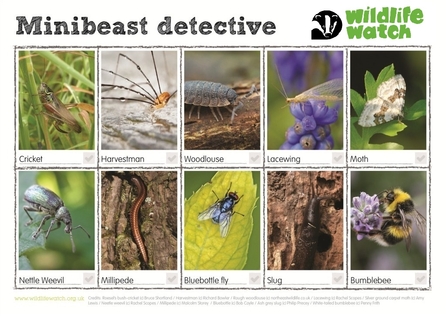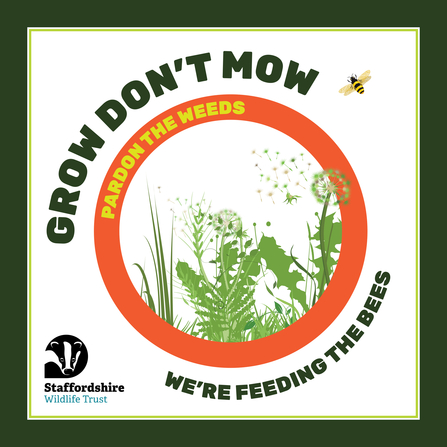
Help the wildlife on your doorstep by locking away your mower with our #growdontmow campaign!
Over 40% off all insects are in decline and your lawn can be a vital source of food and shelter for them. There are roughly 24 million gardens in the UK, making up an area bigger than all of the UK's nature reserves combined. By not cutting the grass you will allow flowers to grow, providing food for insects and bees. Keeping your grass long, even just leaving a few long patches around the edges will benefit all the insects that have laid eggs in your grass.
What do I need?
Nothing, simply lock away your lawn mower to save time and enjoy visits from bees, butterflies, hedgehogs and all sorts of wonderful wildlife, just by not cutting your grass!
When is the best time to do it?
The best time is between April-September. You should wait until all of the flowers have gone before cutting you grass to have the biggest impact.
Get going and follow these simple steps
Your challenge can be large or small, either turn a small patch or the whole garden wild - it is up to you!
Step 1: Leave your grass to grow
Step 2: Watch your garden transform and brim with wildlife
Step 3: Tell your neighbours all about it!
Download our free signs to inspire others to follow your lead and help to feed our bees.
What happens next?
Step 1: Once you decide to make the cut, leave the cuttings to dry out for a few days
Step 2: Have some fun shaking the seeds out ready to sow for next year
Step 3: Get some woody cuttings from your shrubs ready to make a hibernation sandwich with your grass cuttings
Step 4: Next simply find a nice spot, layer the grass cuttings up along with the woody shrub cuttings and keep doing this until you get a big pile of lovely natural insect habitat
Step 5: Get ready to start Grow Don’t Mow all over again!
If a habitat pile isn’t your thing but you don’t want to just throw away the grass cuttings, you could try using them to make your own compost instead. Find out more here. https://www.staffs-wildlife.org.uk/actions/how-compost-your-waste
*Please share your patch on social #growdontmow and inspire others to take the challenge!
What else can you do
Get inspired with some fun ways to go the extra mile for insects and pollinators!
Get Spotting Challenge
We would love to know what wildlife you have seen in your garden as a result of taking part in the Grow Don’t Mow challenge or even once you’ve built your habitat house. Whether it’s a buzzing bee, a toad or wild orchid, use our spotter sheet and then let our Record Centre know what you’ve seen no matter how common you may think it is.
Your sightings help us build valuable county records that we can use to monitor species increase or declines and help us advise on planning applications.
Step 1. Download a spotter sheet here
Step 2. Get outside and see what you can find
Step 3. Record your sighting with our Records Centre
Send Your Sighting To The Record Centre (https://www.staffs-wildlife.org.uk/wildlife/report-wildlife-sighting)
Please share photos of any wildlife you manage to catch on camera using the hashtag #GrowDontMow and inspire others to take on the challenge.

Download the sheet
Keep Growing Challenge
Not ready to cut your grass just yet? Then don’t, instead why not have a bit of fun and see if you could you have the longest grass in Staffordshire?
Step 1. Get your tape measure out.
Step 2. Share a snap on social media using #Growdontmow showing us how long your grass is and you could be crowned the winner.
Grow Don’t Mow Community Challenge
You don’t have to stick to your own garden! Grow don’t mow in your community.
Why not encourage your school, business, street, or local park to leave a patch for pollinators?
Talk to friends, colleagues, or your local council to ask them to leave parts of lawns to grow long between April and July to help wildflowers, insects, and lots of wildlife thrive in your community.
Get in touch if you’d like more advice talking to local councils about creating a wilder community.





